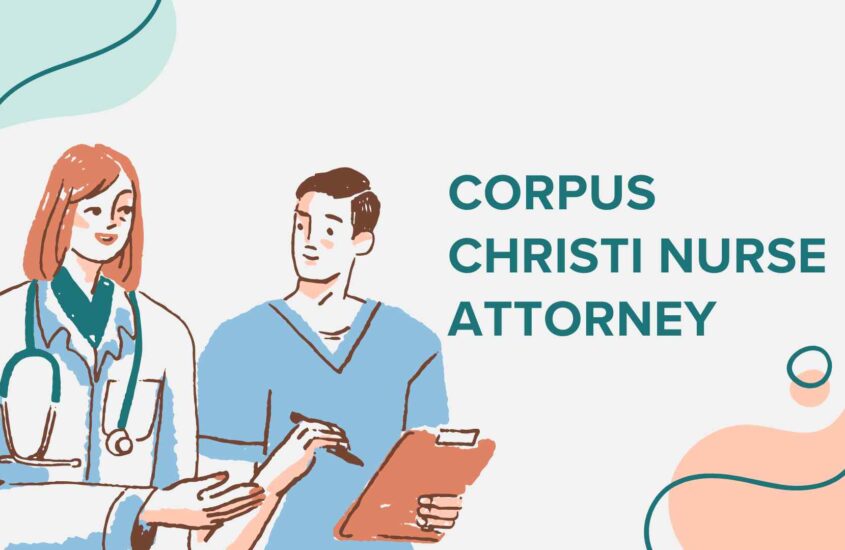Your Guide to Nurses and Attorneys in Corpus Christi

Your Guide to Nurses and Attorneys A Corpus Christi Nurse Attorney is a legal professional based in Corpus Christi, Texas, specializing in representing nurses and healthcare professionals in legal matters. With a deep understanding of the nursing profession and the legal system.These attorneys provide essential guidance and representation to nurses facing disciplinary actions, license suspensions, and other legal challenges. They are skilled in navigating complex healthcare regulations, licensing requirements. And professional standards set by organizations such as the Texas Board of Nursing.
Corpus Christi Nurse Attorneys also handle cases involving medical malpractice, personal injury, and wrongful death claims related to nursing practice. Their expertise in medical terminology and healthcare protocols enables effective communication with healthcare providers, expert witnesses, and jurors. Overall, Corpus Christi Nurse Attorneys play a vital role in protecting the rights and professional reputation of nurses in the Corpus Christi area.Offering support and guidance in the intricate and regulated field of healthcare.
Becoming a Nurse in Corpus Christi
Becoming a nurse in Corpus Christi, Texas, requires fulfilling certain steps and meeting specific requirements. The process generally involves the following:
Education: The first step is to complete a nursing program. Options include diploma programs, associate degree in nursing (ADN) programs, or Bachelor of Science in Nursing (BSN) programs.
Licensure Examination: After graduating from a nursing program, aspiring nurses must pass the National Council Licensure Examination for Registered Nurses (NCLEX-RN) to obtain their nursing license.
State Licensure: Once the NCLEX-RN is successfully completed, the next step is to apply for a nursing license from the Texas Board of Nursing. This involves submitting an application, paying the necessary fees, and providing the required documentation.
Background Check: As part of the licensure process, nurses are typically required to undergo a criminal background check.
Continuing Education: To maintain an active nursing license, nurses must fulfill continuing education requirements. This involves completing a certain number of continuing education units (CEUs) or specific courses within a designated period.
Specializations and Advanced Degrees: Nurses in Corpus Christi may choose to pursue specialization in areas such as pediatrics, critical care, or gerontology. They can also pursue advanced degrees, such as a Master of Science in Nursing (MSN) or Doctor of Nursing Practice (DNP), to expand their career opportunities.
Overall, becoming a nurse in Corpus Christi involves completing an accredited nursing program. Passing the licensure examination, obtaining a state license, fulfilling continuing education requirements, and considering further specialization or advanced degrees to enhance professional growth.
Legal Issues in Nursing Practice
Legal issues can arise in nursing practice due to the complex nature of healthcare and the potential for patient harm. Nurses must be aware of and adhere to the laws, regulations, and ethical standards that govern their profession. Some common legal issues in nursing practice include malpractice, negligence, informed consent, patient privacy and confidentiality, scope of practice, and documentation.
Malpractice refers to situations where a nurse fails to provide a reasonable standard of care, resulting in harm to a patient. This can occur due to errors in medication administration, failure to assess and monitor patients, or inadequate documentation.
Negligence involves a nurse’s failure to exercise the level of care expected in a particular situation, which results in harm to a patient. Examples may include not properly monitoring a patient’s condition or not following established protocols.
Informed consent is an important legal and ethical concept that requires nurses to ensure patients have a clear understanding of the risks, benefits, and alternatives before they provide consent for medical procedures or treatments.
Patient privacy and confidentiality are protected by laws such as the Health Insurance Portability and Accountability Act (HIPAA). Nurses must ensure patient information is kept confidential and only shared with authorized individuals.
Professional Liability and Risk Management
Professional liability and risk management are critical aspects of any profession, including nursing. Nurses must be aware of the potential risks and take proactive measures to minimize them. Professional liability refers to the legal responsibility that professionals, including nurses, have to provide a reasonable standard of care to their patients. In nursing, professional liability can arise from actions or omissions that result in harm or injury to a patient.
To effectively manage professional liability and mitigate risks, nurses can take several important steps. First, they should stay updated on the laws, regulations, and standards of practice relevant to their field. This includes understanding their scope of practice and ensuring they are operating within the boundaries defined by their licensure and professional guidelines.
Effective communication is another crucial aspect of risk management. Nurses should maintain clear and open communication with patients, their families, and other healthcare team members. This helps ensure that important information is shared, patient concerns are addressed promptly, and potential errors or misunderstandings are minimized.
Your Guide to Nurses and Attorneys
Documentation plays a vital role in risk management as well. Accurate and comprehensive documentation of patient assessments, interventions, and outcomes is essential. Proper documentation can provide evidence of the care provided, help identify any deviations from the standard of care, and protect the nurse in case of legal disputes.
Adhering to ethical principles is integral to professional liability and risk management. Nurses should prioritize patient advocacy, maintain patient confidentiality, respect autonomy, and uphold the highest standards of professionalism.
Continuing education and professional development are essential for nurses to stay current with advancements in healthcare and legal requirements. By continuously updating their knowledge and skills .Nurses can provide safe and competent care, reducing the likelihood of errors and potential legal consequences.
By practicing within their scope of practice, communicating effectively. Documenting accurately, adhering to ethical principles. And pursuing ongoing education,your guide to nurses and attorneys can effectively manage professional liability and minimize risks. This helps ensure the delivery of high-quality care while safeguarding the welfare of patients and maintaining the integrity of the nursing profession.

Dealing with Disciplinary Actions
Disciplinary actions in nursing can occur when a nurse is alleged to have violated professional standards or engaged in misconduct. Dealing with disciplinary actions requires a thoughtful and strategic approach.
The first step is to carefully review the allegations and understand the specific charges brought against the nurse. This involves gathering all relevant documentation, such as incident reports, patient records, and any communication related to the allegations.
Next, it is essential to consult with a nurse attorney or a legal professional experienced in nursing disciplinary matters. They can provide guidance on the legal process, potential consequences, and available defense strategies. A nurse attorney can also advocate on behalf of the nurse during hearings or negotiations with regulatory boards or employers.
During the disciplinary process, it is crucial to maintain open and respectful communication with all involved parties. This includes cooperating with investigators, providing requested information, and attending scheduled meetings or hearings. It is essential to approach all interactions professionally and to present a strong defense based on the facts and evidence.
Your Guide to Nurses and Attorneys
Guide to nurses and attorneys facing disciplinary actions should also consider seeking emotional support from colleagues, friends, or support groups. Coping with the stress and uncertainty of the process can be challenging, and having a strong support system can provide reassurance and guidance.
Additionally, nurses should reflect on the situation and evaluate any potential areas for personal and professional growth. Taking steps to enhance knowledge, skills, and adherence to professional standards can demonstrate a commitment to ongoing improvement and may positively influence the outcome of the disciplinary process.
Dealing with disciplinary actions can be a difficult and stressful experience for nurses. By seeking legal guidance, maintaining open communication, seeking emotional support, and focusing on personal and professional growth, nurses can navigate the process more effectively and work towards resolving the disciplinary matter in a fair and satisfactory manner.
Employment Contracts and Legal Rights
Employment contracts and legal rights are essential aspects of any professional relationship. In the context of employment, nurses need to understand the terms and conditions of their contracts and be aware of their legal rights and protections.
Employment contracts outline the terms of employment, including job responsibilities, compensation, benefits, working hours, and termination procedures. Nurses should carefully review and understand the contract before signing, seeking legal advice if needed, to ensure they are aware of their rights and obligations.
Legal rights in employment encompass various areas, such as fair treatment, non-discrimination, and workplace safety. Nurses have the right to a safe and healthy work environment, free from harassment or discrimination based on factors like gender, race, religion, or disability. They also have the right to fair compensation, including overtime pay, and protection against wrongful termination or retaliation.
Understanding legal rights is crucial to ensuring that nurses are treated fairly and their well-being is protected. If there are concerns or violations of their rights, nurses should consider seeking legal advice to understand their options and pursue appropriate recourse.
Overall, employment contracts and legal rights provide guide to nurses and attorneys with the necessary framework and protections in their professional relationships. By being informed about their contractual obligations and legal rights. Nurses can advocate for themselves and ensure a positive and fair working environment.
Workplace Safety and Occupational Health
Workplace safety and occupational health are paramount concerns in any profession, including nursing. Creating a safe and healthy work environment is essential to protect the well-being of nurses and promote optimal patient care.
Workplace safety involves identifying and minimizing potential hazards and risks within the healthcare setting. This includes implementing protocols and procedures to prevent accidents, injuries, and the transmission of infectious diseases. Nurses should be provided with appropriate personal protective equipment (PPE), such as gloves and masks, and trained on their proper use.
Occupational health focuses on ensuring the physical and mental well-being of nurses. This involves addressing work-related factors that can impact health, such as stress, burnout, and exposure to hazardous substances. Employers should provide resources and support mechanisms to help nurses manage their mental health and prevent occupational injuries and illnesses.
To maintain workplace safety and occupational health, nurses should actively participate in safety training programs and adhere to established protocols. They should report any safety concerns or incidents promptly and work collaboratively with colleagues and management to address them.
Employers have a responsibility to prioritize workplace safety and occupational health by establishing comprehensive policies. Conducting risk assessments, and providing necessary resources and training. Regular inspections and evaluations can identify potential hazards and ensure compliance with safety standards.
Regulatory bodies and government agencies also play a role in setting and enforcing workplace safety and occupational health regulations. Nurses should familiarize themselves with these regulations and actively engage in advocating for their enforcement.
By promoting workplace safety and occupational health, guide to nurses and attorneys can reduce the risk of injuries. Protect their own well-being, and provide quality care to patients. A safe and healthy work environment enhances job satisfaction and contributes to the overall success and longevity of the nursing profession.
End-of-Life Care and Ethical Your Guide to Nurses and Attorneys Dilemmas Your Guide to Nurses and Attorneys
End-of-life care involves providing compassionate and supportive care to patients who are nearing the end of their lives. It requires addressing their physical, emotional, and spiritual needs while respecting their autonomy and dignity. However, end-of-life care often presents complex ethical dilemmas for healthcare professionals, including nurses.
One common ethical dilemma in end-of-life care is balancing the principles of autonomy and beneficence. Autonomy recognizes the patient’s right to make decisions about their own care, including choices regarding treatment options and the extent of medical interventions. On the other hand, beneficence emphasizes the healthcare provider’s duty to act in the best interest of the patient. guide to nurses and attorneys may encounter situations where patients express their autonomy by refusing life-sustaining treatments. While healthcare providers may believe those treatments would be in the patient’s best interest.
Another ethical dilemma relates to the appropriate use of pain management and palliative care. Nurses must balance the need to alleviate suffering with concerns about potential adverse effects of pain medication. They may face challenges in determining the right balance between providing adequate pain relief and ensuring patient safety and comfort.
Your Guide to Nurses and Attorneys
Additionally, end-of-life care often involves difficult decisions regarding the withholding . Or withdrawal of life-sustaining treatments, such as ventilators or artificial nutrition and hydration. Nurses may find themselves grappling with the ethical considerations surrounding quality of life, futility of treatment, and the patient’s expressed wishes or advance directives.
Respecting cultural and religious beliefs is another ethical concern in end-of-life care. Nurses must be sensitive to the diverse values and beliefs of patients and their families. Providing culturally appropriate care and facilitating discussions about end-of-life decisions within the context of these beliefs.
To address ethical dilemmas in end-of-life care, nurses should engage in ethical decision-making processes. Seeking interdisciplinary collaboration and guidance from healthcare ethics committees or consultants when necessary. They should also remain mindful of their own biases and seek to provide patient-centered care that respects the values and preferences of the individual.
End-of-life care presents intricate ethical dilemmas for nurses. By engaging in ethical reflection, seeking guidance, and maintaining open and compassionate communication with patients and families, nurses can navigate these challenges while upholding the principles of autonomy, beneficence, and respect for human dignity.
Conclusion
In conclusion, a Corpus Christi guide to nurses and attorneys is a vital legal resource for nurses facing disciplinary actions or legal challenges in Corpus Christi, Texas. These attorneys possess a deep understanding of the nursing profession and the legal system. Allowing them to provide crucial guidance and representation. They specialize in navigating complex healthcare regulations, licensing requirements. And professional standards set by organizations such as the Texas Board of Nursing. Whether nurses are dealing with license suspensions, disciplinary hearings. Or cases involving medical malpractice, personal injury. Or wrongful death claims, Corpus Christi Nurse Attorneys are equipped to protect their rights and professional reputation. With expertise in medical terminology and healthcare protocols, they effectively communicate with healthcare providers, expert witnesses, and jurors. Ultimately, Corpus Christi Nurse Attorneys play a crucial role in safeguarding nurses’ interests, providing support. And navigating the intricacies of the highly regulated healthcare field.









